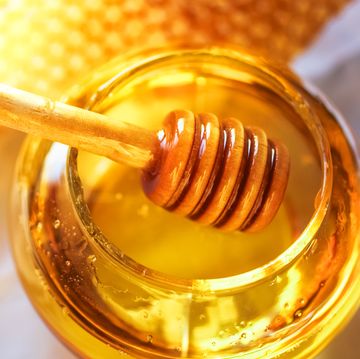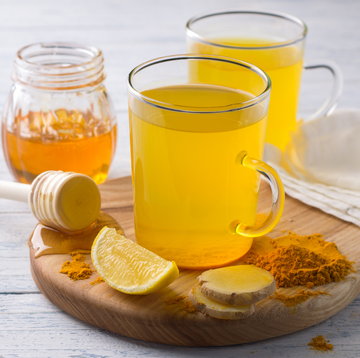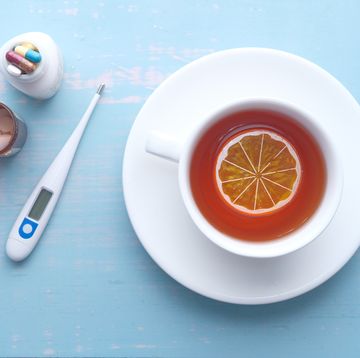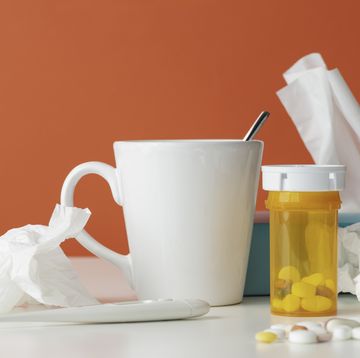Even if you’re staying up to date with all your vaccines, there are a lot of illnesses you still could run the risk of getting. So now that we’re in the thick of cold, flu, RSV, and COVID-19 season again, it’s time to stock your pantry with the comfort foods and immune-boosting nutrients your body needs to stay strong. If you happen to catch something, what should you eat when you’re sick?
“Though we all eat differently when we’re ill, the last thing we want is to make our body work hard to break down our food, so keeping it simple is king,” says dietitian Bonnie Taub-Dix, R.D.N., author of Read It Before You Eat It.
Meet the Experts: Ryan D. Andrews, R.D., C.S.C.S., author of A Guide to Plant-Based Eating; Alex Caspero, R.D.; Deborah Cohen, D.C.N., R.D.N., associate professor in the department of clinical and preventive nutrition sciences at Rutgers University; Jessica Cording, R.D., author of The Little Book of Game-Changers; Melissa Prest, D.C.N., R.D.N., national media spokesperson for the Academy of Nutrition and Dietetics and member of the Prevention Medical Review Board; Bonnie Taub-Dix, R.D.N., author of Read It Before You Eat It; Elena Villanueva, D.C., founder of Modern Holistic Health.
Of course, you want to load up on plenty of nutrients, but Taub-Dix also recommends leaning on easy-to-digest carbohydrates. If you feel up for it, it’s a good idea to try to get some protein in the mix, too, says Jessica Cording, R.D., author of The Little Book of Game-Changers. “Ideally, you want to consume a balance of protein and carbs,” she says.
So, how do doctors and nutritionists nourish themselves when they’re feeling under the weather? They turn to the following 16 foods, which will also help you feel better ASAP.
Foods to eat when you’re sick
1. Oatmeal
“Oatmeal is my ultimate comfort food when I don’t feel well,” says Taub-Dix. “If I feel achy and have a cold incoming on but still have my appetite, I add a heaping spoonful of almond butter, ricotta, or cottage cheese to boost the protein, which supports healing and adds to its creamy texture.” Oatmeal also is known to have other health benefits with one study finding that people who get three servings of whole grains daily have a 15% lower cancer risk overall compared to those who get less.
2. Topped baked potato
Another easy-to-digest carbohydrate, baked potatoes (whether white or sweet) are another great base for an under-the-weather meal. “Most people don’t realize that potatoes provide vitamin C, an important nutrient for healing, and fiber, a gut-supporting nutrient that can be hard to get your fill of when you’re putting your salads on hold,” says Taub-Dix.
If you have the appetite, add some protein to your potato by topping it with cottage cheese or Greek yogurt.
3. Green tea
“Tea is an absolute must when I’m not feeling well,” says Taub-Dix. “Nothing provides as much comfort as a steamy mug.” Soothing quality aside, tea also helps you get in all of the fluids you need—especially if you have a fever or any stomach upset, she says. The warmth also does wonders for an achy, sore throat.
Plus, “green tea, in particular, contains all sorts of beneficial compounds,” explains Ryan D. Andrews, R.D., C.S.C.S., author of A Guide to Plant-Based Eating. “One, called quercetin, may help boost immune function.” An all-around win when you don’t feel well. Still, since you need quality sleep when you’re feeling under the weather, be careful to avoid caffeinated tea before bedtime.
4. Honey
Whether in your tea, mixed into oatmeal or yogurt, or straight out of the spoon, honey is another helpful food when you don’t feel well. Honey "acts as a cough suppressant and helps heal a sore throat," says holistic health practitioner Elena Villanueva, D.C., founder of Modern Holistic Health.
Villanueva likes to add honey to tea or hot lemon water—and recommends choosing unfiltered local wildflower honey or Manuka honey, which are best-known for their antimicrobial properties.
5. Cereal
When you just need something simple, comforting, and easy on your system, Taub-Dix suggests a good ol’ bowl of cereal. Like crackers or pretzels, anything dry and free of spice is a safe option for an upset stomach. “If I’ve had any stomach trouble, I choose almond milk over dairy milk for easy digestion,” she says—choosing a non-dairy option will require less effort in digestion and be the easiest on your sensitive stomach.
If you want to curl up on the couch with a bowl of cereal, Taub-Dix recommends looking for a brand with at least 5 grams of fiber—and as little sugar as possible—per serving. These healthy cereal options are a good place to start.
6. Smoothies
To up her liquid intake—and sneak in some fruits and veggies without having to chew them—Taub-Dix blends up a smoothie. Her usual smoothie starts with an almond milk base, plus frozen spinach and banana, and a scoop of almond butter for protein.
Alex Caspero, R.D., also turns to smoothies when she doesn’t feel so hot. “My go-to combination is one cup of pomegranate juice, 6 ounces of yogurt, and 1 cup of strawberries,” she says. Pomegranate juice contains more antioxidants—which protect cells from damage—than red wine, grape juice, or green tea, she explains. Plus, the yogurt adds protein and fat, transforming the blend into a meal when you don’t really feel like eating.
7. Nuts and seeds
When he’s sick but has the appetite to munch, Andrews turns to nuts and seeds—of all kinds. “Nuts and seeds are rich in vitamin E and zinc, two nutrients that are necessary for optimal immune function,” he says. Pine nuts, cashews, hemp seeds, almonds, flaxseeds, and pumpkin seeds are all great choices.
8. Elderberry syrup
Elderberries, which have long been used in traditional medicine to support immune health, contain powerful antioxidants called anthocyanins. That’s why Andrews incorporates elderberry syrup into his diet daily when he feels sick. “Elderberries have antiviral properties and may help to shorten the length of a cold,” he says. You can sip elderberry syrup straight or add it to yogurt or oatmeal.
9. Chicken soup
You better believe chicken soup is as good for the body as it is for the soul! That’s why it’s a go-to for Villanueva. “Soups not only have high nutritional value but also help keep you hydrated,” she says. “Just stick with a homemade version to avoid harmful chemicals and inflammatory additives that are often found in pre-made canned soups.”
Villanueva loads up her soups with onions and garlic, which both offer unique health perks. Garlic, for example, has an antimicrobial compound that may help combat viruses and bacteria, research shows.
10. Ginger
“One of the best holistic flu remedies out there, the benefits of ginger for cold and flu can be traced back to the pages of ancient philosophies,” says Villanueva. Now we know that ginger contains a number of active compounds (like gingerol) that support our overall health and well-being. One perk in particular: Ginger can ease nausea, a common woe associated with the flu, Villanueva says.
She likes to boil slices of fresh ginger root and sip on the resulting tea when she feels sick to her stomach, has a cough, or feels a sore throat coming on. You can also opt for a quality packaged ginger tea.
11. Cinnamon raisin bagel
Caspero relies on simple, digestible foods—like bananas, rice, applesauce, and toast—when she’s sick. One meal she craves: “A Dave’s Killer Bread Cinnamon Raisin bagel with a little non-dairy butter and a sprinkle of cinnamon.” With 11 grams of protein per serving, she feels good knowing she can enjoy a comforting, easy-to-eat food and still reap some nutritional benefits.
12. Citrus fruits
Perhaps an obvious—but still worthwhile—choice, citrus fruits like lime, lemon, and oranges are rich in vitamin C, a powerhouse antioxidant many of us load up on when we’re sick (or even feel something coming on). One review of research found that vitamin C didn’t really prevent colds, but it did reduce the number of days people experienced cold symptoms by 8 to 9%.
Villanueva likes to add fresh citrus juice (or even the essential oils of citrus fruits) to hot tea when she doesn’t feel well—especially if she’s dealing with lots of phlegm.
13. Legumes
Legumes are packed with the mineral zinc, which plays an important role in immune function—and can even help ease cold and flu symptoms, says Villanueva. She incorporates chickpeas, lentils, and beans into her meals daily when feeling sick. Plus, they’re packed with fiber to keep you feeling full.
14. Scottish oatmeal with honey
“Maybe it’s because they remind me of childhood, or maybe it’s because they settle easier than other foods, but I crave breakfast foods when I’m sick,” says Caspero. “One of my favorite sick-day meals is a big bowl of oatmeal with freshly grated ginger and a drizzle of honey.”
Caspero recommends Bob’s Red Mill Scottish Oatmeal, which has a smooth, creamy texture. Every cup contains about 4 grams of beta-glucan fiber, which has been linked to benefits like healthy gut bacteria, reduced cancer risk and lower LDL or “bad” cholesterol. The fresh ginger on top will also help soothe any nausea.
15. Bone broth
While Cording says that chicken soup is a good choice, she points out that bone broth has some serious perks, too. “It’s easy to digest and has more protein than chicken broth,” she says. It also can help you stay hydrated—a crucial factor if you’re having trouble keeping food down, have diarrhea, or keep getting sweaty due to a fever.
16. Egg Whites
Scrambled egg whites are a good way to get in some protein but are usually gentle on your stomach. “It’s a good option if you can’t tolerate heavier things,” Cording says. Pair it with whole wheat toast if you feel like you can handle it.
Foods to avoid when you’re sick
Above all, it’s important to push the fluids when you’re sick, says Deborah Cohen, D.C.N., R.D.N., associate professor in the department of clinical and preventive nutrition sciences at Rutgers University. But there are certain foods and drinks you should steer clear of.
It’s hard to stay hydrated when you’re not feeling well so skip drinks that contain a lot of caffeine like energy drinks or alcohol which can actually cause some dehydration, says Melissa Prest, D.C.N., R.D.N., national media spokesperson for the Academy of Nutrition and Dietetics and member of the Prevention Medical Review Board. “Some people find it easier to tolerate a hot beverage like tea when not feeling well and that is ok in smaller amounts or try an herbal tea without the caffeine,” she says.
If your illness is taking a toll on your tummy, foods that are higher in fat may be difficult to digest and add to any GI symptoms you are experiencing, notes Prest. Spicy foods may also be irritating and cause stomach upset, she adds. “Go with a more bland diet until you’re feeling better,” Prest suggests.
What to eat if you’re not hungry
If food isn’t your No.1 priority when you’re not feeling well, Cording says that’s OK. “If you feel like you’re not hungry for part of the day, you don’t have to worry about it that much,” she says.
But, if you feel like you haven’t been hungry for more than a day, she suggests trying “simple foods,” just to get some calories in you. “Oatmeal is easy, and usually gentle on the stomach,” she says. She also suggests trying toast with egg whites, drinking bone broth, or having a smoothie, if you think you can tolerate it.
“Keep it simple and don’t force it if you feel like you cannot even look at food,” Cording says. “You just want to focus on hydration.”
Keep this in mind, too, per Cohen: “Often, when sick and dehydrated, our thirst mechanisms may not function properly so dehydration can get worse quickly.” Meaning, you may need to remind yourself to drink consistently, even if you don’t feel thirsty.
Can certain foods speed up recovery from illness?
When you’re sick, you want to get better ASAP, and it’s understandable to wonder if there are any foods that can make you better, faster. Unfortunately the answer is no. “There really are no specific types of food that speed recovery,” Cohen says.
Still, foods high in protein, zinc, vitamin C, and other antioxidants are great for providing the fuel your immune system needs to fight infections, says Prest. “A good bowl of soup, like chicken soup, provides nourishing nutrients that are both hydrating and comforting when you’re not feeling well,” she suggests.
Overall, experts say you shouldn’t be hard on yourself when it comes to your eating plan while you’re sick. “Make sure to rest, stay hydrated, and choose whole foods that will help you recover,” says Prest.
When should you see a doctor if you feel too sick to eat?
If you are unable to stop vomiting and cannot keep any food or beverages down for more than a few hours, give your doctor’s office a call and ask for further instructions, says Prest. “Track your symptoms and monitor your temperature as this will help your doctor make a decision about how best to treat you,” she says.
Madeleine, Prevention’s assistant editor, has a history with health writing from her experience as an editorial assistant at WebMD, and from her personal research at university. She graduated from the University of Michigan with a degree in biopsychology, cognition, and neuroscience—and she helps strategize for success across Prevention’s social media platforms.














